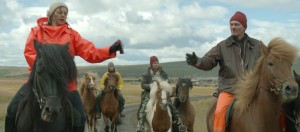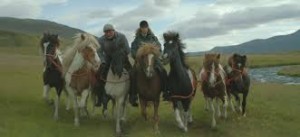 Of Horses and Men is a film that stays in the memory. The debut feature of Benedikt Erlingsson, this particularly Icelandic film focuses on the relationship between men and horses in the Icelandic countryside (horses being a particularly essential Icelandic possessin), and comes on a bit like a Roy Andersson or Aki Kaurismäki take on Equus.
Of Horses and Men is a film that stays in the memory. The debut feature of Benedikt Erlingsson, this particularly Icelandic film focuses on the relationship between men and horses in the Icelandic countryside (horses being a particularly essential Icelandic possessin), and comes on a bit like a Roy Andersson or Aki Kaurismäki take on Equus.
This episodic film weaves together a few overlapping vignettes exploring the interdependent and interlocking relationship between man and animal. First there is Kolbeinn (Ingvar Eggert Sigurðsson of Jar City fame and Iceland’s most famous actor) who loves Solveig (Charlotte Bøving), but he loves also his beloved prized mare Grána, who does a mean (and also rather amusing to see) dressage walk impressing all the locals who are following the developments of Kolbeinn and Solveig. But Grána y to Kolbeinn’s horror likes the stallion Brúnn, resulting in a terribly funny scene in which Brúnn mounts Grána while Kolbeinn is still on her, his look of disbelief, embarrassment and shock is definitely one of the funniest things I’ve seen on film. This comic episode quickly and suddenly however turns dark in the sudden turn of events.
Then there’s Vernhardur who is dangerously in love with vodka and his horse Jarpur who loves Vernhardur to a very loyal degree. Aboard a Russian trawler is a mate by the name of Gengis who doesn’t have vodka but loves horses like Jarpur, leading to a tragic accident. Then there’s feuding neighbours Grimur and Egill. Grimur has a passion for riding his horse down ancient horse roads but Egill likes to erect barbed wire fences cutting of these very roads. Grimur goes about taking down these fences with a pair of pincers, painfully and graphically injuring himself in the process, and Egill who owns a tractor decides to take him on for damaging them.
Russian trawler is a mate by the name of Gengis who doesn’t have vodka but loves horses like Jarpur, leading to a tragic accident. Then there’s feuding neighbours Grimur and Egill. Grimur has a passion for riding his horse down ancient horse roads but Egill likes to erect barbed wire fences cutting of these very roads. Grimur goes about taking down these fences with a pair of pincers, painfully and graphically injuring himself in the process, and Egill who owns a tractor decides to take him on for damaging them.
There’s also Johanna who loves her mare Raudka, but Raudka is too wild and rebellious to be adequately tamed. One day Raudka encounters an
injured old man who turns out to be Grimur and helps him with the aid of her band of horses. Cut to Juan Camillo who loves life and nature and is seeking God in the Icelandic highlands but the horse he rides Old Piebald is tired and longs for rest and he is soon lost and left behind by the group he was riding with, forcing him to take severe measures to survive the weather conditions (the end result of which symbolically ties human to horse in a memorably sacrificial manner).
 This is a film that deftly goes from comedy to tragedy, and tragedy to comedy within a few minutes, and exposes the hypocritical and ridiculous nature of man’s perceived superiority over animals by showing man’s primitive and often destructive animal-like nature. Whilst the cinematography by Bergsteinn Björgúlfsson captures well the bleak and unforgiving sparse and rocky landscape of Icelandic countryside, which no doubt helps to explain the odd and extreme nature the region’s inhabitants. And whilst some of the stories prsented work better than others, it is a unique film-watching experience which certainly makes me keen to see what Benedikt Erlingsson has next up his sleeve.
This is a film that deftly goes from comedy to tragedy, and tragedy to comedy within a few minutes, and exposes the hypocritical and ridiculous nature of man’s perceived superiority over animals by showing man’s primitive and often destructive animal-like nature. Whilst the cinematography by Bergsteinn Björgúlfsson captures well the bleak and unforgiving sparse and rocky landscape of Icelandic countryside, which no doubt helps to explain the odd and extreme nature the region’s inhabitants. And whilst some of the stories prsented work better than others, it is a unique film-watching experience which certainly makes me keen to see what Benedikt Erlingsson has next up his sleeve.



